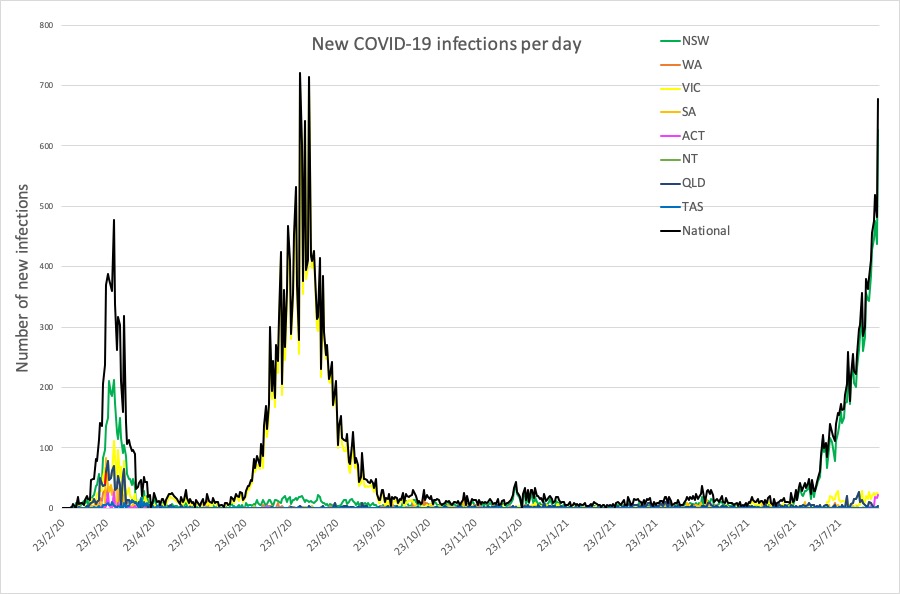And young men showed the highest covid test positivity rates in Canada during 2020.
Welcome to The Medical Republic’s COVID Catch-Up.
It’s the day’s covid-19 news in one convenient post. Email bianca@biancanogrady.com with any tips, comments or feedback.
19 August
- Antibiotic dispensing took a dive during the first covid lockdown in 2020, especially for respiratory conditions.
- Young men most likely to test positive for covid in Canada, after adjusting for testing rates.
- Toddlers more likely to spread covid in households than adolescents.
- Q&A: What are the numbers of vaccinated and partly vaccinated among Australia’s covid cases?
- Q&A: How many people have died from the Pfizer vaccine?
- Spreadsheet SNAFU in UK highlights importance of timely contact tracing.
- US to start delivering covid vaccine boosters from September.
- The latest on the covid vaccine rollout in Australia.
- The latest covid infection numbers from around Australia.
Antibiotic use for respiratory conditions dropped by more than one-third after the introduction of public health restrictions in Australia’s first covid wave in April 2020, research suggests.
A study, published in the British Journal of Clinical Pharmacology, looked at antibiotic dispensing from PBS records between November 2015 and October 2020. This revealed a 36% reduction in the monthly rate of antibiotic dispensing, even after adjusting for seasonal changes, which persisted even into winter.
The biggest drops were seen for roxithromycin, which declined by 69%; amoxicillin, which declined by 53%; and clarithromycin, which declined by 51%. However dispensing rates for flucloxacillin, metronidazole or trimethoprim remained similar over that period.
A breakdown of covid test positivity rates in Canada by age group and sex points to highest positivity rates among young men.
Researchers wrote in the Annals of Internal Medicine that while disease rates during 2020 were highest among older age groups, these were also the age groups with the highest test rates.
Using data from more than 132,000 cases and 6.3 million tests conducted between March-December 2020, researchers calculated that males aged 20-29 were 2.5 times more likely to test positive than the overall population, after adjusting for the frequency of testing. Positivity rates among those aged 10-19 years were two times higher than in the overall population, after adjusting for testing frequency.
“These results… suggest that the elevated rates of reported COVID-19 in older adults are most likely attributable to increased testing due to increased disease severity,” the authors wrote.
Toddlers may present a higher covid transmission risk in households than older children, despite being less susceptible to symptomatic disease, research suggests.
A study published in JAMA Pediatrics looked at 6280 household outbreaks of covid, where the single index case was aged under 18 years.
Researchers found that children aged 0-3 years had a 43% higher odds of transmitting the disease to other members of the household than did those aged 14-17 years, regardless of whether they were symptomatic or not. There was also some evidence that those aged 4-8 had a higher odds of transmitting.
The authors suggested that younger children may have similar or even higher viral loads than adults, but are also less likely to isolate from caregivers, especially if they are unwell.
Q: What are the numbers of cases in fully and partially vaccinated people in Australia?
From 1 March – 31 July 2021 in NSW, 30 (0.9%) of locally acquired cases have been in fully-vaccinated individuals, 247 (7.1%) of cases have been in partly vaccinated individuals, 2979 (85.6%) in unvaccinated individuals and 225 (6.5%) had unknown vaccination status.
It’s also worth noting that in this latest outbreak, only 9 (1.7%) of cases in hospital are fully vaccinated and none in intensive care are fully vaccinated.
Unfortunately this data isn’t available at a national level.
Q: How many people have died from the Pfizer vaccine?
In Australia and the United States, no deaths have been attributed to the Pfizer vaccine, either from anaphylaxis or myocarditis/pericarditis.
Norway did investigate around 100 deaths that occurred in 30,000 nursing home residents who were given the Pfizer vaccine early in the vaccination campaign last year, and concluded that 10 of those deaths were likely linked to vaccination. However the expert group noted that these were very frail elderly patients in whom an adverse reaction could, in a worst-case scenario, lead to earlier death.
(Thanks for the question, and keep them coming! The form for submitting questions is at the bottom of this post).
A spreadsheet coding error which meant contact tracing was delayed for nearly 20% of covid cases in the UK in late September 2020 led to a significant increase in secondary infections and deaths.
Nearly 16,000 cases weren’t followed up by contact tracers in the same time frame as usual because a coding error meant they fell off the bottom of a spreadsheet. The missing cases were also concentrated geographically, which meant it was possible to see some of the effect of this on case numbers and deaths.
A paper in PNAS found that compared to these lost cases, those that were contact-traced appropriately were associated with a 63% lower rate of subsequent new infections and 66% lower rate of deaths in the six weeks following the data error.
Covid vaccine boosters will be rolling out across the United States from late September, as the US Food and Drug Administration announces it is planning to vaccinate all Americans with a third dose, given at least eight months after their second dose.
The plan is contingent on an independent evaluation and evidence review find that a third dose is effective and safe, according to the announcement from the US Centers for Disease Control.
What’s happening in the vaccine rollout this week?
Nationally, 28.5% of those aged over 16 years are now fully vaccinated, and 25.53% have had one dose, leaving 45.97% still unvaccinated. Vaccine coverage increases in the over-50s and in the over-70s:
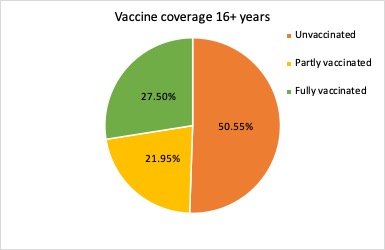
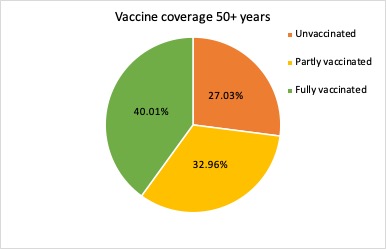
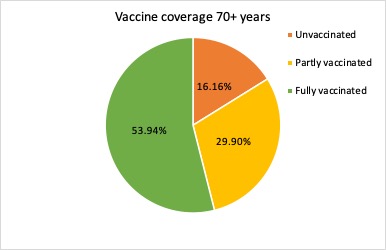
And here are those same figures broken down into five-year age groups:
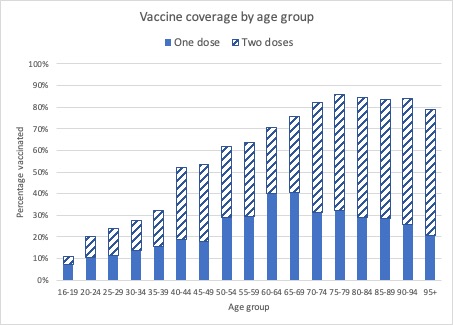
Rates of one-dose coverage are rocketing up in the 16-19-year-olds, likely the result of the focus on getting Yr 12 HSC students in Sydney vaccinated:
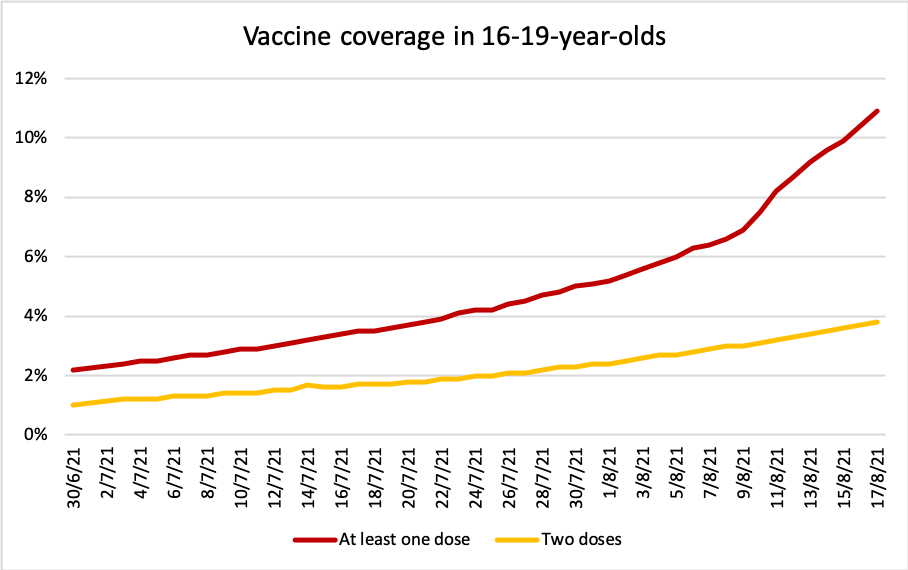
Vaccine coverage in NSW is starting to pull away from the national average, but it’s a slow boat to full coverage:
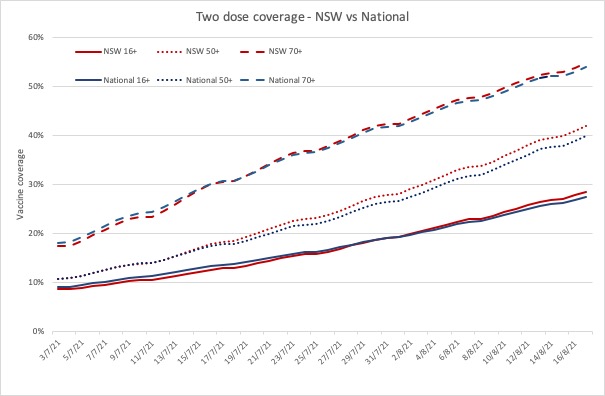
Here are the latest covid-19 infection numbers from around Australia to 9pm Wednesday:
National – 40,774 with 970 deaths
ACT – 191 (22)
NSW – 15,043 (627)
NT – 200 (0)
QLD – 1961 (4)
SA – 868 (0)
TAS – 235 (0)
VIC – 21,214 (23)
WA – 1062 (1)
